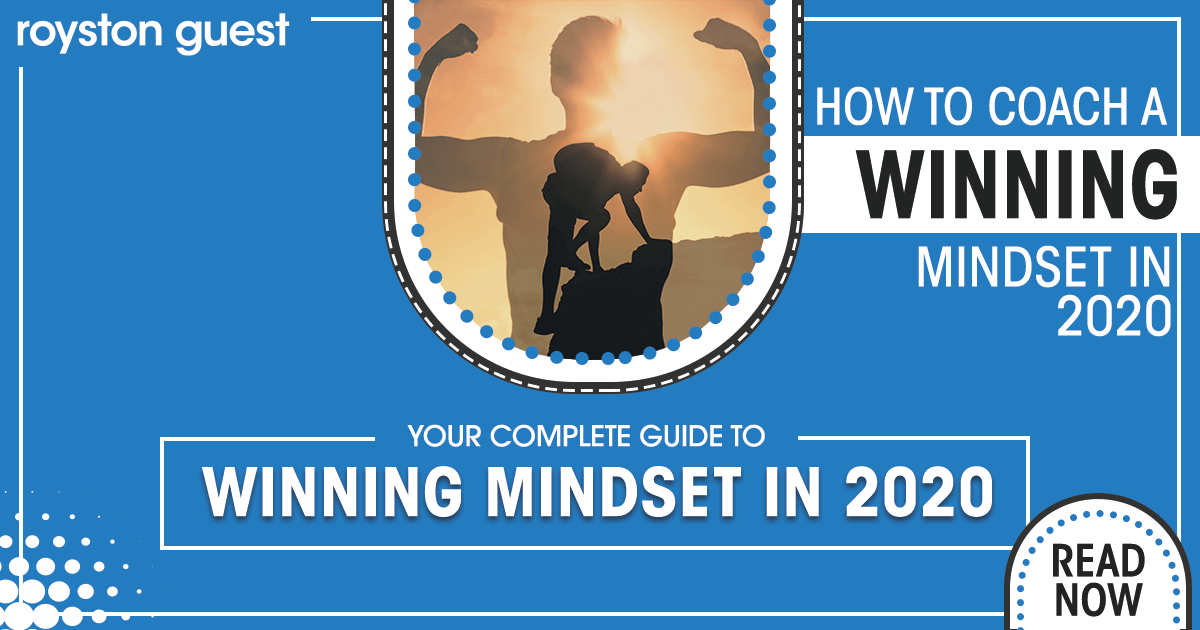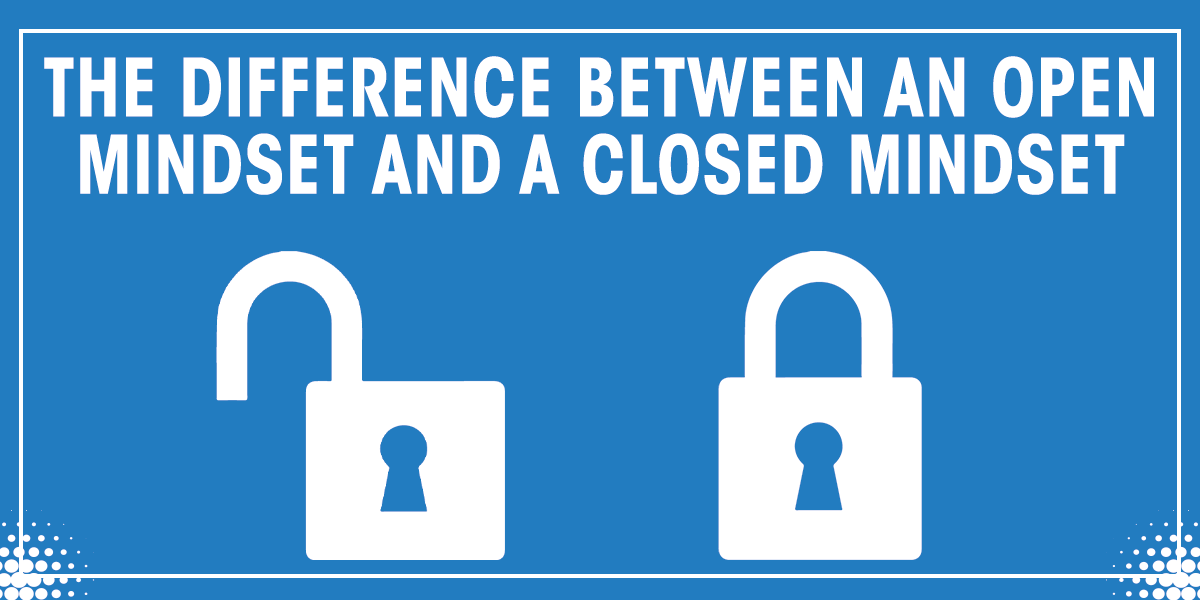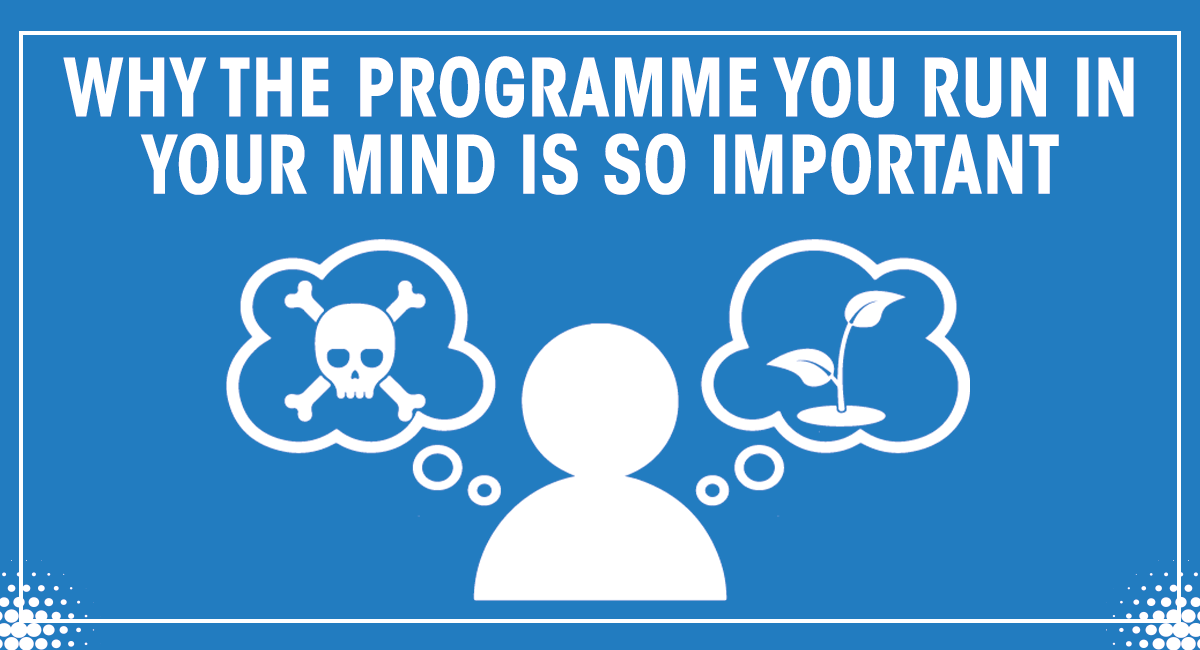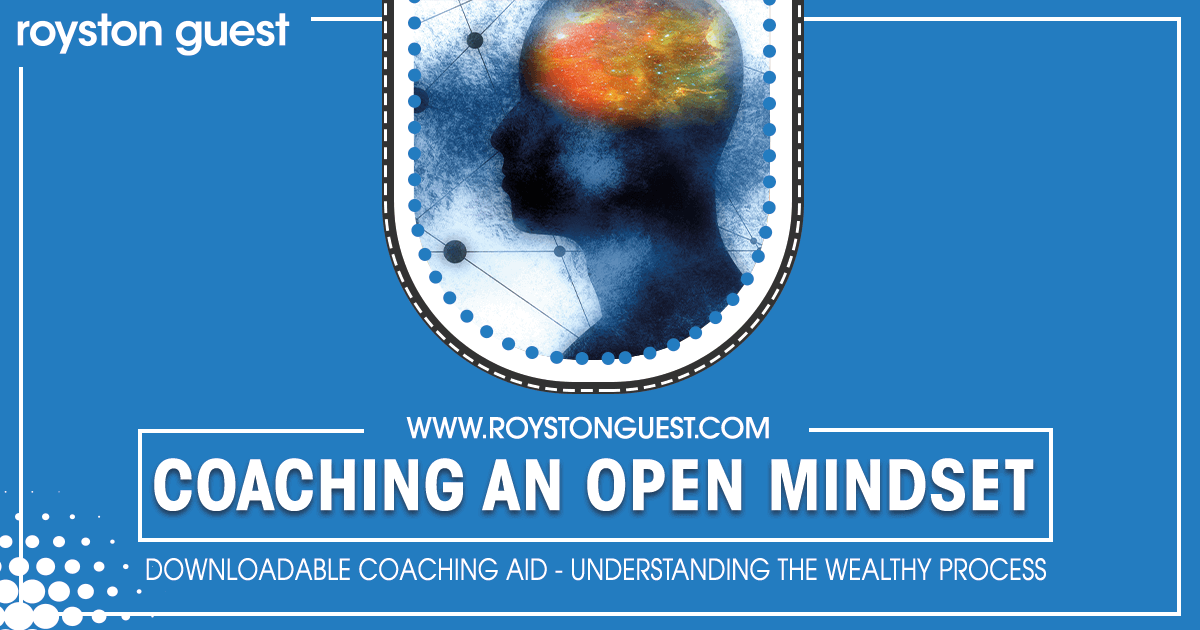Why is it that some people seem to make constant progress in their professional and personal lives, while others appear to remain in the same spot? Not going back but not necessarily moving forward either?
While the answer isn’t cut and dry, over the years, I’ve worked with tens of thousands of people from all walks of life, and I’ve noticed an interesting mindset difference between these two groups of people. Put simply; each group approaches obstacles, challenges and opportunities very differently. One group operates with an open mindset and the other with a closed mindset. Which group are you in?
In this blog, you’ll learn:
The difference between an open mindset and a closed mindset
An individual with an open mindset approaches life, with all its challenges and opportunities, from a basis of growth: an eagerness to learn and a willingness to be wrong; with an attitude of ‘the glass is always half full, not half empty’ looking for the opportunity in the difficulty not the difficulty in the opportunity.
An individual with a fixed mindset, on the other hand, will often dig their heels in at the first sign of disagreement or discomfort and would rather walk away than be wrong or uncomfortable. They usually operate with an attitude of ‘this is how it’s always been, this is how it is’ which manifests itself as routines, comfort zones, and operating within the status quo.
Now, before you slap an ‘I’m open-minded’ sticker on your chest, consider this: closed-minded people would never think they could be closed-minded. Who wants to admit they’re closed-minded?
But having the ability to change your mind is a superpower, especially if deep down you don’t want to. You see, the rate at which you learn and progress depends on how willing you are to weigh the merit of new ideas or new horizons, even if you don’t instinctively like them.
At the heart of the closed vs open mindset is the whole notion of a paradigm. (A paradigm is a typical example or pattern of something). Paradigms can work for you because you have a pattern, a model, a formula to follow which has proved successful to you in the past, so why change?
But they can also work against you.
Sometimes we can get stuck in a pattern of thinking, a closed mindset which can be limiting, or even derailing. Following this same pattern closes our mind to the sense of possibilities around us, meaning we can miss positive and beneficial change without even realising it.
Here’s an example of the Swiss watch industry to demonstrate my point.
In 1968, the Swiss made 65% of all watch sales worldwide and laid claim to as much as 90% of the profits. They were renown for making the best watches in the world and were committed to constant refinement of their expertise.
It was the Swiss who came forward with the idea of the minute hand and the second hand and led the way in discovering better ways to manufacture the gears, bearings, and mainsprings of watches in addition to waterproofing techniques and self-winding models.
But by 1981, some thirteen years later, they had laid off thousands of watchmakers, controlled less than 10% of the world market share and their profit domination dropped to less than 20%. Between 1979 and 1981 alone, fifty thousand of the sixty-two thousand Swiss watchmakers had lost their job.
Why?
Because, despite all their product development ‘firsts’, the Swiss refused to consider a new development, the Quartz movement, which ironically was invented by a Swiss. Because the Quartz movement had no mainspring or knob, it was rejected. It was too much of a paradigm shift for them to embrace. Seiko, on the other hand, accepted it and revolutionised the watch industry as it became the new market leader.
Did you know Blockbuster was approached to buy Netflix four times? FOUR TIMES. But Blockbuster declined. At the end of 2018, Netflix had over 158 million subscribers generating in excess $15.8bn. Eight years prior in 2010, Blockbuster filed for bankruptcy protection.
Talk about a paradigm shift.
So why am I sharing these examples with you?
Because the Swiss watch industry experts nor the Blockbuster Board of Directors would have considered themselves closed-minded. Quite the opposite.
Only when you are conscious and deliberate in your thinking, and subsequent thoughts and actions are you open to the sense of opportunities that are around you.
You start to hunt them out, and by no surprise, they hunt you out too. Next time you dismiss or turn down a new opportunity or new idea, just open your mind for a second to the possibility that this could be a new beginning. It might not be, but at least you’ve had an open mind to it.
Why the programme you run in your mind is so important
Our mindset, while incredibly powerful, does not care what we think; whether success or failure; a concrete, worthwhile goal or confusion, misunderstanding, fear and anxiety. It’s all the same to the human mind, which is happy to manifest either in abundance simply following your freewill and the programme you choose to run.
Suppose a farmer has a plot of good fertile land. The land gives the farmer a choice.
She can plant whatever she chooses. The land doesn’t care what is planted. It’s up to the farmer to make the decision.
But the land, just like your mind, will return what you plant.
Now let’s assume the farmer has two seeds in her hand: one of corn, the other of nightshade, a deadly poison.
She digs two little holes in the earth, plants both seeds, covers up the holes, waters and takes care of the land, nurturing them both.
What do you think will happen?
Invariably the land will return what is planted. Remember, the land doesn’t care.
It will return poison in just as wonderful abundance as it will corn.
So the two plants are cultivated, one helpful and constructive, one destructive and deadly.
The human mind, your mindset, is far more fertile, far more incredible and mysterious than the land.
I don’t know how you’re feeling right now, or how you generally view your life, your circumstances, or whatever you might refer to as luck. But what I do know is this: you could well be missing the big picture because so many of us are. And the big picture is that you and I and every other human being have a distinct advantage over every other living creature on planet Earth because we have 100 per cent control – yes, 100 per cent control – over how we choose to think. And it’s not just control over how we think, but how we choose to think. We can deliberately change this at any point during any given day.
Choice. You have it. So do I, and it’s very, very powerful.
The way you choose to look at your life is key to you being able to create the outcome and life you want to lead.
That’s easy enough to say when everything is going well; you feel powerful and successful and can quickly propel yourself forward. But life is about ups and downs, and at some point, we will all face some sort of challenge or failure. It’s at that those critical junctures, your defining moments, or defining choice points that your ability to harness your winning mindset will set you apart.
So why don’t we use our minds more?
Your mind comes as standard equipment at birth. It’s free, and we don’t tend to value the things that we get for free anything like as much as we should. Everything worthwhile is given to you for free: your mind, your soul, your body, your hopes, your dreams, your ambitions, your intelligence, your love of family and children, friends and country. All these priceless possessions are free. The human mind is not used to its full potential because we take it for granted. Don’t take your mind for granted; make sure you leverage one of the greatest assets you own.
Coaching an open mindset using the WEALTHY PROCESS
The key to success and the key to failure is that you become what you think.
Those of you who follow my work will know I talk passionately about the importance of a growth mindset and how, by unlocking your mindset, you unlock your potential, and believe me, we should not underestimate the power of our mind. There is a direct correlation between what you think and ultimately what you do, and how your thoughts become your reality because your thoughts influence your actions.
Your ability to communicate effectively is an essential skill for maximising your potential. Usually, however, this is about the external conversations and dialogue you have. The challenge we face is that our external dialogue is an extension and manifestation of what is happening internally, inside our head, which usually follows a conversation you’ve had with yourself.
To help me illustrate this, let me introduce you to the WEALTHY process. And no it doesn’t relate to financial wealth but is everything to do with a wealthy growth mindset.
Before I breakdown the WEALTHY process I want to share with you a simple exercise, and as you read the words on the page, I’d like you to use all your senses to bring it to life. You’ll understand in a moment why I am asking you to do this. Trust me; it’s going to be worth it.
I want you to imagine that I’ve placed under your chair a ripe, juicy lemon.
Pick it up, lift it to your nose and have a good sniff of it. Wow, it’s fresh and juicy. Can you smell that?
Next, I want you to put the lemon on the table, or whatever surface is near to you, and hold it firmly with your non- dominant hand.
Then, with your dominant hand, pick up a sharp serrated knife and cut through the lemon, from top to bottom. Be careful not to mark the table. Don’t worry about all the juices that are running everywhere; we’ll clean those up later.
When you’ve done that, put the knife down and pick up half of the lemon. Now, lift it to your nose for a second time and smell. It’s so fresh, and I bet from the scent alone you can tell this is going to be sharp-tasting, can’t you?
Well, let’s find out. I want you to take a big bite of the lemon and let the juice swirl around in your mouth. Taste it. Wow, it’s sharp, isn’t it?
Let the lemon juice move around in your mouth, mixing with your saliva, reducing the bitter, sharp taste of lemon.
Now, take another bite and do it again. How does that taste?
OK, put the lemon down and answer this one question: do you have extra saliva in your mouth right now?
Now if you went with me on the journey and completed the exercise, let’s look at how that scenario plays out against the WEALTHY process.
WEALTHY PROCESS
W = WORDS
Intalk
The little voices inside your head with which you have some of your most important daily conversations. In his book, The Chimp Paradox, Dr Steve Peters, talks about your inner voice as your chimp always talking away. It sometimes sets you up for success but on other occasions plants seeds of doubt in your mind, even sabotaging or derailing your potential. Yes, intalk is that important!
Outtalk
The conversations you have with others. Just imagine having a conversation with someone negative all the time. If that’s their outtalk, imagine what the discussions are like with themselves!
Otherstalk
The things other people say. There’s a great saying: you become like the five people you spend the most time with. Choose carefully.
In the lemon example, we observed the power of ‘otherstalk’, because it was my dialogue leading the conversation and building a mental image of the lemon in your mind using words.
E = ENCODE YOUR BELIEFS
The words – whether intalk, outtalk, otherstalk or, usually, a combination of all three – start to encode your beliefs about the world around you and how you perceive your life. The belief you acquired through the example was that you had a juicy lemon in your hand and your mouth and, boy, did it smell and taste sharp!
A = WHICH AFFECT YOUR ATTITUDES
Your beliefs then shape your attitude, both internally about yourself, including your self-confidence and self-belief (your inlook), and also your outlook in terms of how you look and see the world. Do you see the opportunity in the difficulty or the difficulty in the opportunity? In this case, your attitude internalised the existence of the lemon and how it made you feel.
L = WHICH IN TURN CREATES LEVERAGE
Leverage is about one of two things: avoidance of pain or the gaining of pleasure. In this case, the lemon was so sharp that your brain received a hotwired message from your nerve sensors that action was required.
T = LEADING YOU TO TAKE ACTION
The ‘take action’ in this exercise was to neutralise the acidity, and your brain triggered a chemical reaction in your body, resulting in your salivary glands producing saliva, which of course is an alkali, neutralising the acidity of the lemon.
H = AND HAVE RESULTS
The result is more saliva, just as you experienced it. The increase in saliva was a real phenomenon, created by your brain, which reacted to the stimulus that was received only by reading the words on the page or hearing my voice on audio.
Isn’t that incredibly powerful?
Y= AND WHO IS IT DOWN TO? IT IS DOWN TO YOU!
There is a direct correlation between what you say and what you do. Your words … encode your beliefs … which affect your attitude … which creates leverage … to take you to action … to have and achieve results, and – guess what? – it’s all down to you.
If you can trigger a chemical reaction from your brain by merely internalising a message about a lemon, imagine how you can influence and take control of other internal programmes you’re running.
Downloadable coaching tool – Coaching an open mindset
Download my WEALTHY PROCESS coaching tool to help you recognise the connectivity of your words with your subsequent behaviour and actions to control and influence your internal conversations. It all starts with your thoughts and your mindset.
Download your coaching tool here.
Follow Royston Guest on Facebook to coach you along your winning mindset journey.






